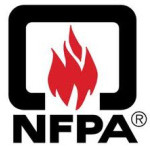- Branche: Fire safety
- Number of terms: 98780
- Number of blossaries: 0
- Company Profile:
Established in 1896, NFPA's mission is to reduce the worldwide burden of fire and other hazards on the quality of life by providing and advocating consensus codes and standards, research, training, and education.
A clear space suitable for fire-fighting operations by motorized fire apparatus.
Industry:Fire safety
A classification of confined spaces that incorporates the size, configuration, and accessibility of an entry opening as well as the internal configuration/entanglement structures within the space.
Industry:Fire safety
A classification of a foam concentrate that includes the chemical composition as defined under foam concentrate, including the use percentage, the minimum usable temperature, and the fuels on which the concentrate is effective.
Industry:Fire safety
A classification assigned to a structure based on its Occupancy Category and the severity of the design earthquake ground motion at the site as defined in ASCE/SEI 7, Section 11. 4.
Industry:Fire safety
A classification assigned to a site based on the types of soils present and their engineering properties as defined in ASCE/SEI 7, Section 20.
Industry:Fire safety
A Class II, Division 1 location is a location: (1) In which combustible dust is in the air under normal operating conditions in quantities sufficient to produce explosive or ignitable mixtures, or (2) Where mechanical failure or abnormal operation of machinery or equipment might cause such explosive or ignitable mixtures to be produced, and might also provide a source of ignition through simultaneous failure of electric equipment, through operation of protection devices, or from other causes, or (3) In which combustible dusts of an electrically conductive nature may be present in hazardous quantities.
Industry:Fire safety
A Class I, Zone 2 location is a location: (1) In which ignitable concentrations of flammable gases or vapors are not likely to occur in normal operation and, if they do occur, will exist only for a short period; or (2) In which volatile flammable liquids, flammable gases, or flammable vapors are handled, processed, or used but in which the liquids, gases, or vapors normally are confined within closed containers of closed systems from which they can escape, only as a result of accidental rupture or breakdown of the containers or system, or as a result of the abnormal operation of the equipment with which the liquids or gases are handled, processed, or used; or (3) In which ignitable concentrations of flammable gases or vapors normally are prevented by positive mechanical ventilation but which may become hazardous as a result of failure or abnormal operation of the ventilation equipment; or (4) That is adjacent to a Class I, Zone 1 location, from which ignitable concentrations of flammable gases or vapors could be communicated, unless such communication is prevented by adequate positive-pressure ventilation from a source of clean air and effective safeguards against ventilation failure are provided.
Industry:Fire safety
A Class I, Zone 1 location is a location: (1) In which ignitable concentrations of flammable gases or vapors are likely to exist under normal operating conditions; or (2) In which ignitable concentrations of flammable gases or vapors may exist frequently because of repair or maintenance operations or because of leakage; or (3) In which equipment is operated or processes are carried on, of such a nature that equipment breakdown or faulty operations could result in the release of ignitable concentrations of flammable gases or vapors and also cause simultaneous failure of electrical equipment in a mode to cause the electrical equipment to become a source of ignition; or (4) That is adjacent to a Class I, Zone 0 location from which ignitable concentrations of vapors could be communicated, unless communication is prevented by adequate positive pressure ventilation from a source of clean air and effective safeguards against ventilation failure are provided.
Industry:Fire safety
A Class I, Zone 0 location is a location in which: (1) Ignitable concentrations of flammable gases or vapors are present continuously, or (2) Ignitable concentrations of flammable gases or vapors are present for long periods of time.
Industry:Fire safety
A Class I, Division 2 location is a location: (1) In which volatile flammable gases, flammable liquid-produced vapors, or combustible liquid-produced vapors are handled, processed, or used, but in which the liquids, vapors, or gases will normally be confined within closed containers or closed systems from which they can escape only in case of accidental rupture or breakdown of such containers or systems or in case of abnormal operation of equipment, or (2) In which ignitable concentrations of flammable gases, flammable liquid-produced vapors, or combustible liquid-produced vapors are normally prevented by positive mechanical ventilation, and which might become hazardous through failure or abnormal operation of the ventilating equipment, or (3) That is adjacent to a Class I, Division 1 location, and to which ignitable concentrations of flammable gases, flammable liquid-produced vapors, or combustible liquid-produced vapors above their flash points might occasionally be communicated unless such communication is prevented by adequate positive-pressure ventilation from a source of clean air and effective safeguards against ventilation failure are provided.
Industry:Fire safety
